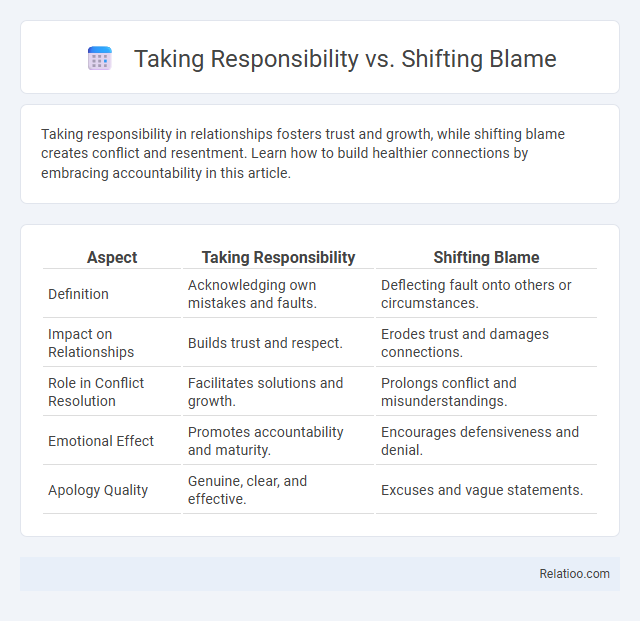Taking responsibility in relationships fosters trust and growth, while shifting blame creates conflict and resentment. Learn how to build healthier connections by embracing accountability in this article.
Table of Comparison
| Aspect | Taking Responsibility | Shifting Blame |
|---|---|---|
| Definition | Acknowledging own mistakes and faults. | Deflecting fault onto others or circumstances. |
| Impact on Relationships | Builds trust and respect. | Erodes trust and damages connections. |
| Role in Conflict Resolution | Facilitates solutions and growth. | Prolongs conflict and misunderstandings. |
| Emotional Effect | Promotes accountability and maturity. | Encourages defensiveness and denial. |
| Apology Quality | Genuine, clear, and effective. | Excuses and vague statements. |
Understanding Personal Accountability
Understanding personal accountability means recognizing your role in outcomes and accepting responsibility for your actions without deflecting or shifting blame onto others. Taking responsibility fosters trust, growth, and problem-solving, while blame-shifting or deflection undermines relationships and impedes personal development. Your ability to own your decisions strengthens integrity and promotes constructive communication.
The Psychology Behind Blame Shifting
Blame shifting occurs when individuals avoid accountability by attributing their mistakes to others, often driven by a deep-rooted fear of failure or damage to self-esteem. Psychological defense mechanisms such as projection and denial play critical roles in this behavior, allowing individuals to evade guilt and preserve their self-image. Understanding these underlying cognitive processes is essential for fostering emotional intelligence and promoting personal responsibility.
Consequences of Avoiding Responsibility
Avoiding responsibility through shifting blame or deflection often leads to damaged trust and weakened relationships in both personal and professional contexts. This behavior can cause stagnant growth, as individuals and teams fail to learn from mistakes or take corrective actions. Organizations experiencing persistent blame-shifting typically face reduced morale, lower productivity, and increased conflict, hindering overall success and development.
Benefits of Owning Your Actions
Owning your actions fosters personal growth by promoting self-awareness and accountability, which enhances trust and credibility in relationships. Taking responsibility empowers you to learn from mistakes, leading to improved decision-making and resilience. Shifting blame or deflecting accountability often damages reputation and stalls progress, whereas embracing your role in outcomes boosts confidence and drives success.
Common Signs of Blame-Shifting Behavior
Common signs of blame-shifting behavior include consistently avoiding accountability, frequent use of excuses, and redirecting fault onto others during conflicts. Individuals exhibiting this behavior often refuse to acknowledge mistakes, instead attributing problems to external factors or other people. This deflection undermines trust and prevents constructive problem-solving in personal and professional settings.
How Responsibility Fosters Trust and Growth
Taking responsibility cultivates trust by demonstrating accountability and reliability in personal and professional relationships. Embracing ownership of actions promotes growth through self-reflection and learning from mistakes, fostering continuous improvement. Conversely, shifting blame and deflection erode credibility and hinder development by avoiding accountability and obscuring the truth.
Strategies to Stop Shifting Blame
Taking responsibility fosters personal growth and trust, while shifting blame and deflection hinder accountability and damage relationships. To stop shifting blame, cultivate self-awareness by reflecting on your actions and their consequences, practice honest communication without excuses, and develop problem-solving skills that focus on solutions rather than assigning fault. Your commitment to these strategies leads to stronger connections and improved decision-making.
Cultivating a Culture of Accountability
Cultivating a culture of accountability requires emphasizing taking responsibility over shifting blame or engaging in deflection, which erodes trust and hampers teamwork. Your leadership can foster transparency by encouraging open communication and clearly defining individual roles, promoting ownership of actions and outcomes. Reinforcing accountability leads to improved performance, stronger collaboration, and sustainable organizational growth.
The Impact of Leadership on Responsibility
Effective leadership directly influences organizational culture by promoting responsibility rather than shifting blame or deflecting accountability. When leaders model accountability, team cohesion strengthens and productivity improves, reducing conflicts and fostering trust. Your ability to take responsibility sets a powerful example that drives ethical behavior and long-term success.
Moving Forward: Embracing Responsibility in Daily Life
Embracing responsibility in daily life fosters personal growth and strengthens relationships by encouraging accountability for actions and decisions. Moving forward requires self-reflection and a proactive mindset to learn from mistakes instead of shifting blame or deflecting accountability. Cultivating this habit enhances problem-solving skills and promotes trust in both personal and professional environments.

Infographic: Taking Responsibility vs Shifting Blame
 relatioo.com
relatioo.com